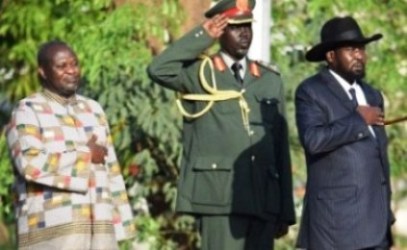South Sudanese parties differ over purpose of states committee
June 2, 2016 (JUBA) – Conflict has emerged over interpretation of the would-be formed committee by the South Sudanese presidency to review the number and boundaries of states in the country, with differing explanations as to the main purpose of the committee in determining the status of states in South Sudan.

In a public joint spoken statement to reporters on Wednesday after the meeting, which was also broadcasted on the national television, the South Sudan Broadcasting Corporation (SSBC), Machar and Wani said the committee would determine the number of new states and their boundaries.
The inclusive membership committee would include 10 from South Sudanese peace partners and the other 5 from the international community. The committee will recommend a way forward within 30 days.
However, Ateny Wek Ateny, President Kiir’s press secretary, told the media on Thursday that the main purpose of the committee was not about the number of states, but rather about reviewing the boundaries of the created new 28 states which “bother” people.
He said the committee’s task will be to try to determine the boundaries of the 28 states, but added that they may add more states to the current 28 but will not be allowed to reduce the number.
“The importance of the committee is specifically to settle the borders and see the problems that bother the states. The committee can come up with a recommendation to increase the number of states but it’s impossible that it could be less than 28 states. Because nobody will accept that his state will be removed. Nobody will want that. Whose state will be removed and whose state will remain,” he asked.
But in an interview broadcasted by the United Nations-run Miraya FM radio on Thursday morning, James Gatdet Dak, First Vice President Machar’s press secretary, told the UN radio that the committee will review the “number of the states as well as their boundaries.”
He said if the committee will not agree on the number of states, they will simply revert to the 10 states as provided for in the August 2015 peace agreement.
When contacted in a separate interview by Sudan Tribune on Thursday, Dak said the armed opposition faction of the Sudan People’s Liberation Movement (SPLM-IO) is for the 10 states as a priority.
“As for the SPLM (IO), we want to abide by the peace agreement. The agreement talks of the 10 states. This is our priority now, not 21 or 28 states,” Dak said, while referring to 21 states earlier proposed by the SPLM-IO during the peace negotiations in Addis Ababa last year and the 28 states created by President Kiir’s faction in Juba five weeks after the peace agreement was signed.
Dak said more states may be premature for now given the security and economic challenges in the implementation of the peace agreement, coupled with the conflicts over states boundaries that the new 28 states have brought about.
He said the country, through the 15-member inclusive committee, may soon within 30 days confirm maintaining the 10 states and delay creation of more states to later period in the transitional period or after 2018 elections.
Dak acknowledged that the presidency had not yet put on paper the terms of reference for the 15-member committee, adding “this could be the reason for the misinterpretation of the task given to the committee.”
(ST)
